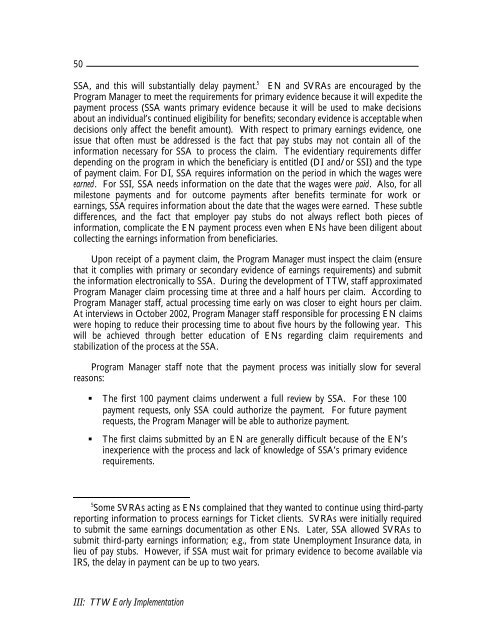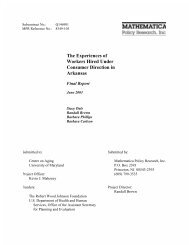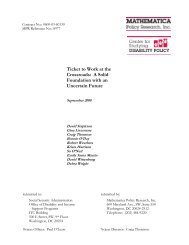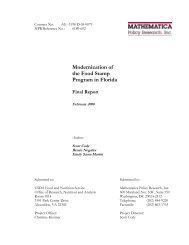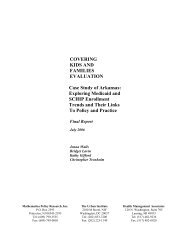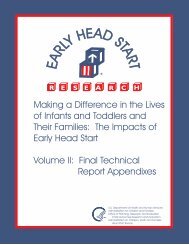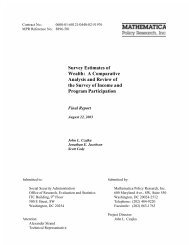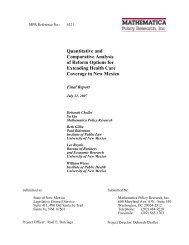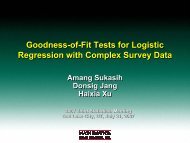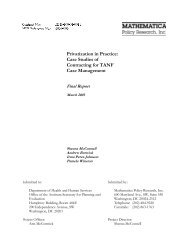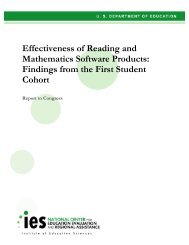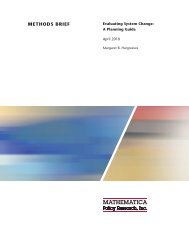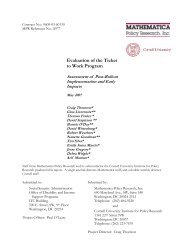Evaluation of the Ticket to Work Program Initial Evaluation Report
Evaluation of the Ticket to Work Program Initial Evaluation Report
Evaluation of the Ticket to Work Program Initial Evaluation Report
You also want an ePaper? Increase the reach of your titles
YUMPU automatically turns print PDFs into web optimized ePapers that Google loves.
50<br />
SSA, and this will substantially delay payment. 5 EN and SVRAs are encouraged by <strong>the</strong><br />
<strong>Program</strong> Manager <strong>to</strong> meet <strong>the</strong> requirements for primary evidence because it will expedite <strong>the</strong><br />
payment process (SSA wants primary evidence because it will be used <strong>to</strong> make decisions<br />
about an individual’s continued eligibility for benefits; secondary evidence is acceptable when<br />
decisions only affect <strong>the</strong> benefit amount). With respect <strong>to</strong> primary earnings evidence, one<br />
issue that <strong>of</strong>ten must be addressed is <strong>the</strong> fact that pay stubs may not contain all <strong>of</strong> <strong>the</strong><br />
information necessary for SSA <strong>to</strong> process <strong>the</strong> claim. The evidentiary requirements differ<br />
depending on <strong>the</strong> program in which <strong>the</strong> beneficiary is entitled (DI and/or SSI) and <strong>the</strong> type<br />
<strong>of</strong> payment claim. For DI, SSA requires information on <strong>the</strong> period in which <strong>the</strong> wages were<br />
earned. For SSI, SSA needs information on <strong>the</strong> date that <strong>the</strong> wages were paid. Also, for all<br />
miles<strong>to</strong>ne payments and for outcome payments after benefits terminate for work or<br />
earnings, SSA requires information about <strong>the</strong> date that <strong>the</strong> wages were earned. These subtle<br />
differences, and <strong>the</strong> fact that employer pay stubs do not always reflect both pieces <strong>of</strong><br />
information, complicate <strong>the</strong> EN payment process even when ENs have been diligent about<br />
collecting <strong>the</strong> earnings information from beneficiaries.<br />
Upon receipt <strong>of</strong> a payment claim, <strong>the</strong> <strong>Program</strong> Manager must inspect <strong>the</strong> claim (ensure<br />
that it complies with primary or secondary evidence <strong>of</strong> earnings requirements) and submit<br />
<strong>the</strong> information electronically <strong>to</strong> SSA. During <strong>the</strong> development <strong>of</strong> TTW, staff approximated<br />
<strong>Program</strong> Manager claim processing time at three and a half hours per claim. According <strong>to</strong><br />
<strong>Program</strong> Manager staff, actual processing time early on was closer <strong>to</strong> eight hours per claim.<br />
At interviews in Oc<strong>to</strong>ber 2002, <strong>Program</strong> Manager staff responsible for processing EN claims<br />
were hoping <strong>to</strong> reduce <strong>the</strong>ir processing time <strong>to</strong> about five hours by <strong>the</strong> following year. This<br />
will be achieved through better education <strong>of</strong> ENs regarding claim requirements and<br />
stabilization <strong>of</strong> <strong>the</strong> process at <strong>the</strong> SSA.<br />
<strong>Program</strong> Manager staff note that <strong>the</strong> payment process was initially slow for several<br />
reasons:<br />
• The first 100 payment claims underwent a full review by SSA. For <strong>the</strong>se 100<br />
payment requests, only SSA could authorize <strong>the</strong> payment. For future payment<br />
requests, <strong>the</strong> <strong>Program</strong> Manager will be able <strong>to</strong> authorize payment.<br />
• The first claims submitted by an EN are generally difficult because <strong>of</strong> <strong>the</strong> EN’s<br />
inexperience with <strong>the</strong> process and lack <strong>of</strong> knowledge <strong>of</strong> SSA’s primary evidence<br />
requirements.<br />
5 Some SVRAs acting as ENs complained that <strong>the</strong>y wanted <strong>to</strong> continue using third-party<br />
reporting information <strong>to</strong> process earnings for <strong>Ticket</strong> clients. SVRAs were initially required<br />
<strong>to</strong> submit <strong>the</strong> same earnings documentation as o<strong>the</strong>r ENs. Later, SSA allowed SVRAs <strong>to</strong><br />
submit third-party earnings information; e.g., from state Unemployment Insurance data, in<br />
lieu <strong>of</strong> pay stubs. However, if SSA must wait for primary evidence <strong>to</strong> become available via<br />
IRS, <strong>the</strong> delay in payment can be up <strong>to</strong> two years.<br />
III: TTW Early Implementation


